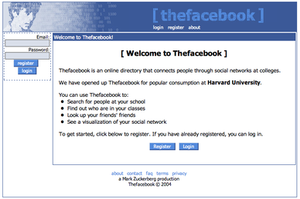Parents asked to leave kids alone in Facebook
 Image via Wikipedia
Image via WikipediaI know, there comes a time when kids grow up, and an age group dictates in their growing up years that they wanted to be left alone and on their own - if not with their peers. This is the dangerous years, and while it is beneficial to let them off at times, letting and leaving them alone also spells disaster.
It is a balance, therefore.
For the responses to that kid's letter, read on below...
Give teenagers space
I REFER to "Parents as Facebook friends? No thanks" (April 19). I am a lecturer with Temasek Polytechnic Business School and I share Tan Ren Yi's views.
Parents should not be overly concerned when their children are actively engaged on social media platforms like Facebook and Twitter.
While technology has its flaws, we should leverage on the advantages that it brings to us.
For example, Facebook allows people to share positive thoughts and encouragement on a viral nature. Such positive doses of energy, when injected at the right time, can help us live better as individuals.
Parents should also question their motives of making friends with their kids on Facebook. Is it really a form of surveillance tool or genuinely a platform to communicate and understand them better?
Ren Yi has the right to choose his own friends, as we all do. Give teenagers and young adults some space to live their "social media lifestyle". Empowerment breeds contentment. And being contented as an individual will help this world a better place.
-----
It's about communication
I REFER to "Parents as Facebook friends? No thanks".
This issue throws up an important point that is often missed whenever the Internet or any aspect of it is the subject of discussion: At the heart of the issue is usually a non-Web related factor.
In this case, it is that of communication between parents and children. If basic communication channels have been established, then parent-child interactions on Facebook will likely be framed by mutual respect and acceptance that each age group has a different way of conversing with friends.
This is true even for off-Facebook interactions. On the other hand, if basic communication is lacking, then Facebook becomes just another front for the tussle for the trust and respect between the two factions that is taking place in real life.
The feeling of being "stalked" by parents on Facebook does not pop up suddenly from Facebook alone.
Neither does the feeling that children are conducting their interactions inappropriately.
Activity on the Internet is similar to activity anywhere else - it is just that it is more intense, compacted as it is into particular sites in a shorter time frame, giving us the impression that (a) it is a whole new problem, and (b) we can take site-specific shortcuts to control it.
Neither is true.
It is only an old problem in a new sphere, and because of that, any steps to control it lie mostly outside of that sphere- - at the dinner table, in the car and on all those other occasions when parents and children can reach out to each other.
The Internet does bring with it some particular problems and issues that need to be specifically dealt with, but being your child's Facebook friend should be an extension of your friendship in real life.
If you are there to check up on your child, then perhaps you should look elsewhere for the problem.
Taken from TODAY, Voices - Tuesday, 20-April-2010
-----
![Reblog this post [with Zemanta]](http://img.zemanta.com/reblog_e.png?x-id=40243a95-70e5-464a-b9e1-73549fb98565)


0 comments:
Post a Comment